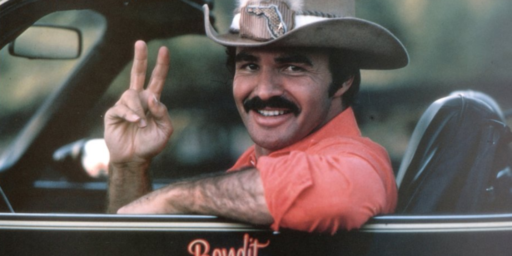Interest Rates and Hacky Political Analysis
Seniors face a variety of economy-based difficulties--but let's criticizes the media!
 Glenn Reynolds takes to the pages of USAT to ask: Seniors suffer under Obama. Where’s the outcry?
Glenn Reynolds takes to the pages of USAT to ask: Seniors suffer under Obama. Where’s the outcry?
He starts with a bit of snark and then heads into a real issue:
Thank goodness we have a Democrat in the White House. Otherwise, America’s seniors would be facing a serious crisis.
The ingredients of the crisis are already here. Interest rates on bonds, CDs and money market accounts — staples of the retirement crowd’s portfolio — are at historic lows. (I’m always shocked to see what banks are touting. Really? 0.35% — that is, 35/100 of a percent — on a money market? 0.90% on a CD? Yep.) Stocks are nothing to write home about, still well below their highs of five years ago. As for those real estate investments? Forget about it.
The squeeze is real. Some years ago, when earning say 5% on your money was realistic, a $360,000 portfolio of CDs would produce $18,000 a year in interest — that’s $1500 a month. Couple that with an unexceptional Social Security payment of about the same amount, and that’s $36,000 a year, $3,000 a month. Nothing fancy, but enough to get by.
On the one hand, it is true that seniors who rely on interest earned from certificates of deposit find this situation highly problematic. Indeed, I have been aware, anecdotally, about this issue for some time (and know that it has gotten worse of late) via family members.
Reynolds’ main complaint, I think, is really a media critique rather than a policy critique (since he describes the policy in vague terms, but does not actually address it). Instead, we get more snark:
I’ve been watching these developments for a while, and by now you’d expect a lot of sad news coverage about old people who diligently saved for retirement being squeezed by high prices and federal policies, being forced to choose between medicine and food or having to let go of pets and move in with children because things have just gotten too expensive, living on cat food and the like. But actually, we’re not hearing much.
I can’t help but feel that we’d be hearing a lot more if the White House were occupied by a Republican, rather than a Democrat who has received unprecedented news media support. But luckily, that’s not the case. So let’s be thankful that a major national crisis has been averted. At least until Jan. 20, 2013, anyway.
As such, I am not sure if he is really concerned about the policy as much as he wants to makes this into a sideways charge of media bias.
Regardless, I find the approach problematic for several reasons.
1. The Fed, not the White House, Sets Interest Rates. To try and peg this (even obliquely) on the administration is a problem because the president has no power to set (or even to influence) the process by which interest rates are set, save by the very indirect process of appointments. As such, to try and link low interest rates on CDs to an administration is to ignore the policy mechanisms that exits.
2. The Current Fed Chair was Originally Appointed by President Bush. Ben Bernanke was originally appointed to the Board of Governors of the Federal Reserve System by President George W. Bush, and was originally named him Chair. President Obama later re-nominated him to that position. If one wants to pretend like Presidents are responsible for/control everything, then one has to be a bit more forthright about how the process works. Of course, the bottom line with interest rates is that it is highly unlikely rates would be any different under a President McCain than they have been.
3. Low Interest Rates are Nothing New. We have been in an era of low interest rate for some time. Yes, they have gotten lower of late. I think it has something to do with the largest global financial crisis since the Great Depression. Reynolds is a bit disingenuous on this count, by the way. As noted in the quote above, he compares current rates to rates of 5%. The problem is, it has been quite a few years now since one could get 5% on a CD. Indeed, the last time that was the case was, you guessed it, before the financial collapse (see here). Indeed, 2007 was the last peak in such rates, while the 2001-2005 era was below, often well below, 5%. The last time we consistently had CD rates in the 5% range was the 1990s. In other words: he is comparing the worst rates in the last decade with the best of that same decade while ignoring the fluctuations over that time frame.
4. A Change in President is not Going to Affect Interest Rates. The basic structure of the Fed will remain the same regardless of who is elected in November. (Reynolds does acknowledge this in the piece, to be fair).
5. Higher Interest Rates for CDs Also Means Higher Rates for Loans. Is Reynolds’ suggesting hat the economy would be better off if interest rates increased? While this would help some seniors and other investors, it would mean higher borrowing costs. How would that help, for example, the housing and auto industries? How about small businesses looking for loans? And yes, he does acknowledge that “low interest rates are a boon to overextended banks and to the borrowers who owe them money.”
These kinds of columns drive me me crazy because they misinform, miseducate, and therefore confuse the public. Pointing out the effects of low interest rates on seniors who rely on interest income is legitimate. Using it simply as a foil for Obama/the media isn’t, because of the reasons noted above. I find it even more annoying from someone whose job is to educate. An honest assessment of the situation has to include the broader policy and economic contexts and an acknowledgement that not a lot can be done to deal with the situation save for things like fiscal policy (i.e., providing greater benefits, such as through higher Social Security payments).
One of the things I crave is an honest debate about policy, which requires public intellectuals to be precise and focused on getting the general public to understand the debates that shape policy, rather than using any and all discussions of the political as an opportunity to be partisan. Yes, I know, Sisyphus, meet rock.
Reynolds and I can agree that the low rates are problematic for seniors who rely on the income from interest as an empirical matter. The problem becomes, however, what the appropriate policy solutions might be. For one thing, this situation underscores the difficulties linked to privatized retirement, as even seniors who save (or invest in stocks and bonds) can find themselves in trouble if the economy does not behave. Is Reynolds suggesting that there ought to be higher Social Security payments? Does he want the Fed to be a political body that can be forced to raise interest rates? Does he think that tighter monetary policy would be good for the economy? Does he want the government to get involved with food prices (another issue that he notes as squeezing seniors)? Is there a point to this column apart from the fact that is happening during the Obama administration and that media isn’t reporting it as a sob story?
The column would have been more useful if it had avoided the need to start with a political dig that sets the tone for the entire piece and if it had likewise avoided/toned down the snark aimed at the media. I will allow that the topic is worth discussing and even that it has not received adequate attention, but Reynolds comes across as less concerned about the problem than he is the fact that Obama administration is not taking enough heat on the topic (because, really, his main gripe seems to be “I can’t help but feel that we’d be hearing a lot more if the White House were occupied by a Republican, rather than a Democrat who has received unprecedented news media support”). Finally, it would have been nice if he actually had some ideas about how to deal with these issues. At the end of the day the piece seems to be simply saying: seniors have it bad, Obama is president, and the media isn’t blaming him enough.






But, leaving facts aside, Obama’s president and it’s tough to be a senior. It’s time for a change.
Steven, are you aware that by the end of 2012 President Obama will have appointed or re-appointed all of the Fed’s governors? If the Fed’s policy isn’t the policy the president wants to follow he has a very strange way of showing it.
@Dave Schuler: Are you suggesting that presidents can actually control interest rates via those appointments? I would suggest that this is not the case.
Further, we both know that there is a substantial bipartisan consensus on monetary policy in basic terms at the moment (indeed, there is a rather global one).
Indeed. Which is why my mother took steps to get my grandfather’s money into high-divident yielding stocks instead. So far, so good (though of course those are riskier).
…
Fed policy is, screaming from the Paulites aside, a bi-partisan thing. I agree with Dave that obviously Obama approves of current Fed policy. It’s just that it’s not any different than Fed policy under Republicans was/would be. So where’s the meat here? There isn’t any. It’s just whining about the status quo (and the librul media).
Which is what Glenn Reynolds does, basically. Heh, indeed.
@Rob in CT:
To clarify: I agree. So, that leaves us with a need, perhaps, to debate these policies if their outcomes are considered problematic. Instead we get snark and the suggestion that changing presidents would matter in some way.
We’ve generally been in a low interest rate environment since the housing boom during the Bush years, this did not originate with Obama. Conservatives like Reynolds are dishonest – but I get it , it’s understandable, they want Obama out.
Future seniors are going to get obliterated by the Ryan-Romney Plan to privatize Medicare. Most of the responsibility to cut health and medical insurance expenses will be shifted to retirees.
@Rob in CT: Heh, indeed, indeed.
Not exactly sure which column you were reading, Stephen. It’s not a “sideways charge of media bias.” It’s a direct assault. Why does Reynolds have to offer a policy solution in order to make the case that the media would be much more concerned about the problems facing seniors if a Republican was President?
@Steven L. Taylor:
Right. I’ve seen criticism of Fed policy. The Paulites believe the Fed itself is eeeeevil, and will rant on about the inflation monster. Portions of the left believe the Fed is too concerned with inflation and not concerned enough about the other side of the dual mandate – employment (Yglesias has been banging this drum for some time).
I find myself rejecting the Paulite argument, emotionally agreeing with the Yglesias argument but not really believing that the Fed can do anything about unemployment at this point (and, thus, that emotional agreement is worthless). The whole “inflation targetting” thing strikes me as voodoo.
@Septimius:
This overall lament is nonsensical. He is complaining in USA Today (and cites a WSJ piece about this topic). Last time I checked, those were part of the “the media>”
Does he expect that if Romney is elected there will be prime time specials on interest rates and seniors? This is just part of a decades-old whine about liberal media bias–a whine that is hard to take seriously in an era in which the top cable news outlet is clearly conservative in orientation and where news is rather plentiful online.
Conservative pundit whines about liberal media, in opinion piece published in said media, part nine thousand.
@James Joyner:
I would really love to see an essay from you laying out what you think President Romney and a Republican-majority House would generate in terms of legislation, and how that would be better than the status quo
Shorter:
Glenn Reynolds writes a hit-piece against Obama using mis-information to target an important demographic amongst USA-Today readers: seniors.
I can’t say I am surprised.
@Steven L. Taylor:
Curiously, only Democrats can’t recognize liberal media bias. I wonder why?
@Rick Almeida: I think you have to adjust your sarcasm detector. Although JJ makes no bones about the fact he’s a conservative, he isn’t known for condoning this kind of junk “journalism”.
@Septimius: A poll of perceptions does not prove (nor disprove) media bias. It measures what people think about the media, not what is true about the media.
@Septimius:
Curiously, conservatives always whine about “liberal media bias” whenever someone points out conservative lies and misrepresentations. I wonder why?
@James Joyner:
That’s what I’ve long called the “throw the chief in the volcano” level of argument.
On the larger topic, investment advisers tell seniors to either build a bond ladder or to buy an annuity.
Many a slip between cup and lip, and not to blame seniors stuck with short term CDs, but …
Having everything in short term CDs was never a brilliant plan.
(I wish I’d better laddered the “banks” portion of my portfolio.)
I assumed James had his tongue in his cheek there. Was I wrong? Was that a serious comment?
@Rob in CT:
Oh, I think he was joking, but people were left to guess the the spirit of the humor.
(I did not vote that one, up or down.)
@Murray:
Murray, that’s not what I meant…or perhaps you’re right, after a couple more readings of James’ comment. I’d still like to see that essay. 🙂
@Steven L. Taylor:
Ok. Let’s look at what is true about the media:
Donations by media companies tilt heavily toward Obama
Members of the media are 4 times more likely to self-identify as liberal than conservative.
The ombudsman for the Washington Post admitted that the paper tilted coverage toward Obama in the 2008 campaign.
New York Times ombudsman just called out his paper for liberal bias.
Numerous journalists have admitted that news coverage favors Obama.
I could go on, but this comment will probably sit in OTB purgatory because of all the links as it is.
@Septimius:
Even if every one of those claims is true, you act like there isn’t an opposing conservative media operation (that doesn’t even bother attempting objectivity).
I would say that the MSM is clearly socially liberal. On economics/taxes/spending, not so much.
@Rob in CT:
The fact that Fox News is has a conservative bias doesn’t magically cancel out liberal bias at virtually every other news organization.
As for economics/taxes/spending, that’s kind of the point of Reynolds column. Given the same economic conditions we have now, but with a Republican President, we’d be hearing much more about how bad things are for seniors. We might even start hearing about how they have to eat dog food.
Considering what Paul Ryan would like to do to Medicare and Social Security and that Mitt Romney has shown support for Ryan’s ideas, those things that we could hear about about with a Republican President would have the benefit of being truthful…
Seniors are just a small portion of the problem of artificially low interest rates. And these artificial low interest rates began after 9/11.
@Andre Kenji:
In the US the low rates started with Greenspan’s Fed, post Dot.Com
It’s the whole idea behind The Mess That Greenspan Made